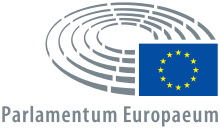Sheffield (European Parliament constituency)
| Sheffield | |
|---|---|
| European Parliament constituency | |
 European Parliament logo | |
| Member state | United Kingdom |
| Created | 1979 |
| Dissolved | 1999 |
| MEPs | 1 |
| Sources | |
Sheffield was a European Parliament constituency covering the City of Sheffield and parts of Derbyshire in England.
Prior to its uniform adoption of proportional representation in 1999, the United Kingdom used first-past-the-post for the European elections in England, Scotland and Wales. The European Parliament constituencies used under that system were smaller than the later regional constituencies and only had one Member of the European Parliament each.
When the constituency was created in 1979, it consisted of the Westminster Parliament constituencies of Chesterfield, Derbyshire North East, Sheffield Attercliffe, Sheffield Brightside, Sheffield Hallam, Sheffield Heeley, Sheffield Hillsborough and Sheffield Park. In 1984, Park was replaced by Sheffield Central, and the boundaries of the other constituencies changed. Larger changes occurred in 1994, when the Derbyshire constituencies were removed to Nottinghamshire North and Chesterfield and replaced by Barnsley West and Penistone.[1]
Members of the European Parliament
| Elected | Name | Party | |
|---|---|---|---|
| 1979 | Richard Caborn | Labour | |
| 1984 | Bob Cryer | Labour | |
| 1989 | Roger Barton | Labour | |
Results
| European Parliament election, 1979: Sheffield[2] | |||||
|---|---|---|---|---|---|
| Party | Candidate | Votes | % | ±% | |
| Labour | Richard Caborn | 77,219 | 50.7 | N/A | |
| Conservative | S. L. Batiste | 64,157 | 42.1 | N/A | |
| Liberal | K. A. Salt | 10,951 | 7.2 | N/A | |
| Majority | 13,062 | 8.6 | N/A | ||
| Turnout | 29.4 | N/A | |||
| Labour win (new seat) | |||||
| European Parliament election, 1984: Sheffield[2] | |||||
|---|---|---|---|---|---|
| Party | Candidate | Votes | % | ±% | |
| Labour | Bob Cryer | 93,530 | 56.8 | + 6.1 | |
| Conservative | D. R. Grayson | 47,247 | 28.7 | - 13.4 | |
| Liberal | G. M. Holmstedt | 23,935 | 14.5 | + 7.3 | |
| Majority | 46,283 | 28.1 | + 19.5 | ||
| Turnout | 29.5 | + 0.1 | |||
| Labour hold | Swing | ||||
| European Parliament election, 1989: Sheffield[2] | |||||
|---|---|---|---|---|---|
| Party | Candidate | Votes | % | ±% | |
| Labour | Roger Barton | 109,677 | 58.2 | + 1.4 | |
| Conservative | T. S. R. Mort | 40,401 | 21.4 | - 7.3 | |
| Green | P. L. Scott | 26,844 | 14.2 | N/A | |
| Social and Liberal Democrats | A. H. Rogers | 10,910 | 5.8 | - 8.7 | |
| International Communist | D. E. Hyland | 657 | 0.4 | N/A | |
| Majority | 69,276 | 36.8 | + 8.7 | ||
| Turnout | 33.7 | + 4.2 | |||
| Labour hold | Swing | ||||
| European Parliament election, 1994: Sheffield[2] | |||||
|---|---|---|---|---|---|
| Party | Candidate | Votes | % | ±% | |
| Labour | Roger Barton | 76,937 | 58.5 | + 0.3 | |
| Liberal Democrat | S. Agninotti | 26,109 | 19.9 | + 14.1 | |
| Conservative | K. Twitchen | 22,374 | 17.0 | - 4.4 | |
| Green | B. A. New | 4,742 | 3.6 | - 10.6 | |
| International Communist | M. England | 834 | 0.6 | + 0.2 | |
| Natural Law | R. E. Hurford | 577 | 0.4 | N/A | |
| Majority | 50,828 | 38.6 | + 1.8 | ||
| Turnout | 27.5 | - 6.2 | |||
| Labour hold | Swing | ||||